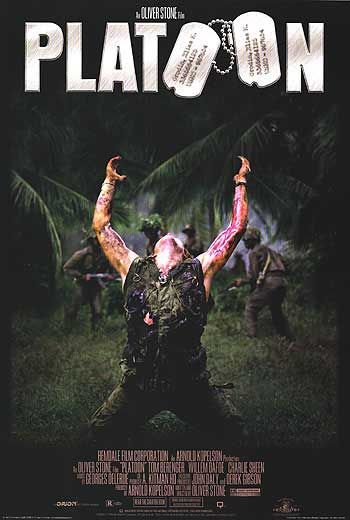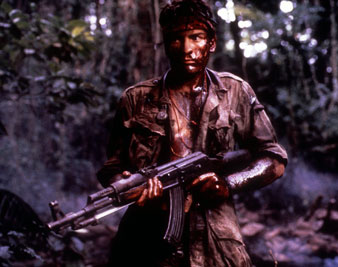"Somebody once wrote: "Hell is the impossibility of reason." That's what this place feels like. Hell"
 A war film, created in 1986, about a war which took place during the 1960's, being viewed in 2010: Inaccessible, right? Dead wrong. Platoon is as prescient now as it was when it was released, by director Oliver Stone (Director of Wall Street), to the public. This film is operating on several levels: One, it exposes the senselessness of the Vietnam, and in fact all, War(s); two, it provides us with a stirring look at the current disparities caused by race, economic class, and moral fiber, and three, probably most importantly, it forces you to face the, almost Jungian, brutality of man and the limits of violence both against the 'other' and against our fellow brother.
A war film, created in 1986, about a war which took place during the 1960's, being viewed in 2010: Inaccessible, right? Dead wrong. Platoon is as prescient now as it was when it was released, by director Oliver Stone (Director of Wall Street), to the public. This film is operating on several levels: One, it exposes the senselessness of the Vietnam, and in fact all, War(s); two, it provides us with a stirring look at the current disparities caused by race, economic class, and moral fiber, and three, probably most importantly, it forces you to face the, almost Jungian, brutality of man and the limits of violence both against the 'other' and against our fellow brother. In one of the films most striking scenes, this idea of man vs. man is made, rather viscerally, obvious: The platoon that we follow for the duration of the film is divided into two factions, the one supporting Sgt. Elias, portrayed, rather beautifully, by Willem Dafoe, and the other supporting Sgt. Barnes, played by Tom Berenger. Elias is opposed to harming the Vietnamese, fails to understand the need for war, etc. and Barnes is the 'Rambo' figure, gung-ho to win this war, even if it means killing innocent civilians. Elias has gone off by himself to flank a NVA position, but Barnes tells the rest of the troops to fall back and that he will go and find Elias. What then occurs is a fast-paced search sequence, as an audience member you first see the frantic cuts as a reflection of the tension in the scene, but it turns into the tension between the characters; Barnes is no longer searching for Elias, he is hunting him (Think Connell's "The Most Dangerous Game"). Barnes finds Elias and promptly shoots him, supposedly, killing him. These two men are both American soldiers, but they uphold opposing ethical beliefs, and in war, beliefs are all you have, and to Barnes, they are enough to kill over. Because, hell is the impossibility of reason, and war, although caused by logical thought as the Dadaist would say, is devoid of reason; war is emotion, war is man vs. man, a primal undertaking to see whose stick is the biggest.
In one of the films most striking scenes, this idea of man vs. man is made, rather viscerally, obvious: The platoon that we follow for the duration of the film is divided into two factions, the one supporting Sgt. Elias, portrayed, rather beautifully, by Willem Dafoe, and the other supporting Sgt. Barnes, played by Tom Berenger. Elias is opposed to harming the Vietnamese, fails to understand the need for war, etc. and Barnes is the 'Rambo' figure, gung-ho to win this war, even if it means killing innocent civilians. Elias has gone off by himself to flank a NVA position, but Barnes tells the rest of the troops to fall back and that he will go and find Elias. What then occurs is a fast-paced search sequence, as an audience member you first see the frantic cuts as a reflection of the tension in the scene, but it turns into the tension between the characters; Barnes is no longer searching for Elias, he is hunting him (Think Connell's "The Most Dangerous Game"). Barnes finds Elias and promptly shoots him, supposedly, killing him. These two men are both American soldiers, but they uphold opposing ethical beliefs, and in war, beliefs are all you have, and to Barnes, they are enough to kill over. Because, hell is the impossibility of reason, and war, although caused by logical thought as the Dadaist would say, is devoid of reason; war is emotion, war is man vs. man, a primal undertaking to see whose stick is the biggest. This film is the Hurt Locker of the 80's and in many ways sets a unique precedent for each war movie that was to follow in its filmic footsteps. This film is operating on multiple levels and is examining universal concepts of morality, violence, and man's inescapable nature. Oh, and be sure to catch a young Johnny Depp smoking the ganja.
This film is the Hurt Locker of the 80's and in many ways sets a unique precedent for each war movie that was to follow in its filmic footsteps. This film is operating on multiple levels and is examining universal concepts of morality, violence, and man's inescapable nature. Oh, and be sure to catch a young Johnny Depp smoking the ganja.The clip that follows is certainly the most famous sequence of the film (a moment from which dons the poster and DVD covers) and occurs just after the scene I described above. Elias, is, after all, not dead...
2 comments:
And there is the whole reading of Elias as a Jesus figure, especially the way he dies in this scene.
It's a powerful film, especially when they go into the village and we see the brutality of the military.
Interesting, as Dafoe was to play Jesus only two years after this film debuted.
Post a Comment